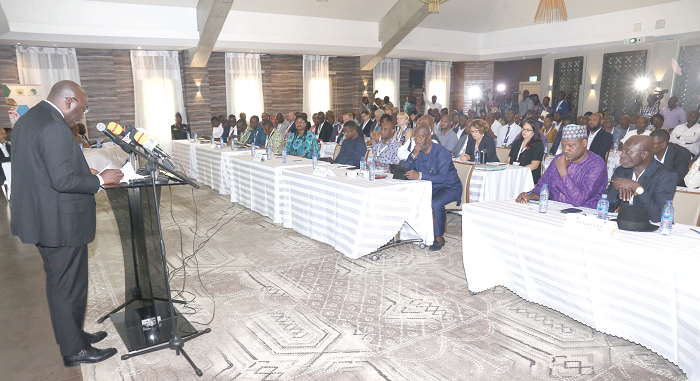
Experts draw up Marshall Plan for agric sector
Agricultural experts from Ghana and other parts of the world have gathered at Peduase in the Eastern Region for a two-day consultative forum to develop a Marshall Plan to transform the agricultural sector in Ghana.
Advertisement
The plan is expected to build on the Planting for Food and Jobs initiative of the government and help enhance food security, improve farm productivity, strengthen linkages with manufacturing, create jobs and improve rural livelihoods and wealth.
Addressing the opening session of the meeting, the Vice-President, Dr Mahamudu Bawumia, asked the participants to come up with bold and innovative solutions to the challenges of agriculture.
He said it was crucial for the forum to set the stage for the Marshall Plan to drive and attract investments to the agricultural sector.
“Yes, we have discovered oil, but let us do with agriculture what a finite natural resource could never do for our people,” he charged the participants.
Dr Bawumia underscored the need for the experts to help ignite the hope towards agriculture, saying: “Let’s provide confidence for the nearly 50 per cent of our labour force in agriculture and attract more of our youth away from the rush to small-scale and illegal mining.”
Policy direction
On the policy direction of the government, Dr Bawumia said the vision of President Nana Addo Dankwa Akufo-Addo was to have a plan that would be implemented to give meaning to the hopes and aspirations of the people.
“We ask for a comprehensive, innovative and implementable Ghana’s agricultural development plan. We have higher expectations of this forum and the work of the technical committee to follow,” he said.
He said it was for all those reasons that the government had set out to address the state of the country’s agriculture in a comprehensive way.
Of immediate interest, he said, was the implementation of the flagship policy, the Planting for Food and Jobs, which was launched in April 2017.
Comprehensive consultation
The Vice-President explained that the comprehensive consultation process was intended to build on the policy and frame integrated agricultural linkages to be launched in 2018.
“The ultimate goal is to structurally transform agriculture for industrialisation and sustainable economic growth,” he said.
He said worldwide, agricultural transformation had been the precursor to the acceleration of industrial growth.
Ghana, he said, had the land resources, human, state and institutional capacity to step up efforts to ensure improved agricultural productivity, sufficient availability of agricultural raw materials for industry and stimulate rural development.
Dr Bawumia pointed out, however, that “this is only possible through a co-ordinated and coherent strategy to transform agriculture”.
Giving a brief account of the state of agriculture over the period, he said the economy experienced an average growth rate of six per cent from 2005 to 2015.
During the period, he said, services and industry grew and surpassed agriculture’s contribution to the gross domestic product (GDP).
“The contribution of agriculture to GDP fell to 0.8 per cent in 2011, significantly down from 5.3 per cent in 2010. Though the sector improved its contribution to 2.3 per cent in 2012 and 5.2 per cent in 2013, its performance subsequently declined,” he added.
The Dutch disease
The Vice-President said the recent decline in the country’s agriculture, according to some observers, was symptomatic of the Dutch disease problem, made worse by the rampant surface mining activities by illegal miners.
He recounted how the onset of petroleum production in Nigeria in the 1960s and in Cameroun in the early 1970s led to the decline of the agricultural sectors of those countries, partly as a result of policy neglect of the sector and partly as a result of the shift of labour from the agricultural sector to the oil sector.
Despite their vast arable land and potential as food baskets, Dr Bawumia said, Cameroun and Nigeria had now become net food importers.
He also made reference to the Agriculture Transformation in Africa Report launched in October 2017 and said to address those challenges required effective state institutions designing and implementing the right policies and providing the needed supporting infrastructure.
For his part, the Minister of Agriculture, Dr Owusu Afriyie Akoto, said the main focus of the forum was to create a platform to discuss key challenges and, most importantly, proffer solutions that would lead to the development of a long-term strategy for the agricultural sector.



